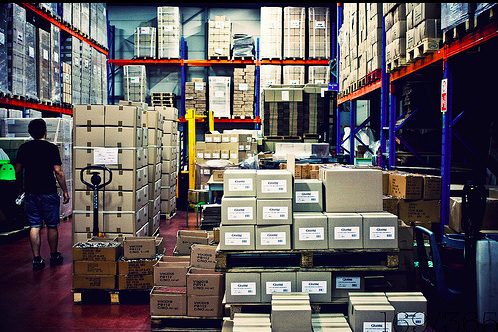We last caught up with HD Trade Services in August, when the company, part of Y Combinator’s summer class, released a tablet app to help smaller enterprises manage the process of buying and shipping goods from one country to another, by offering visual inspections (by way of photos and HD video) of goods to minimize fraud.
Now HD Trade Services is taking that concept one step further: it’s created a platform for logistics service providers, and their buyers and sellers, to source, buy, sell, and trade any product, without any risk. Or, in the words of co-founder Daniel Sugarman, “We are waging war against traditional B2B marketplaces like Alibaba.”
The platform covers all geographies, but HD Trade Services have two specific initial targets in mind: China, and toppling the giant Alibaba from its trading platform throne.
Sugarman and co-founder Daniel Sperling-Horowitz, believe that both are ripe for disruption. As China has grown as a manufacturing powerhouse, Alibaba has become the default trading platform for many manufacturers and companies that buy their goods in China and export them to sell or trade on elsewhere. But it’s a platform that Sugarman and Sperling-Horowitz, as a goods trader in a past life, has seen first-hand is riddled with fraud — inaccurate orders and bait and switch being some of the tactics used.
The two also believe that the ratings/points vetting system implemented by Alibaba, for “gold supplier” status, is also broken: “We believe Alibaba’s International Marketplace business model is fundamentally flawed because they generate their revenue predominantly from suppliers who they sell Gold Supplier shields to,” says Sugarman. “There is a misaligned interest to sell these Gold Supplier shields to any supplier willing to pay the annual fee. As a result, buyer confidence has been seriously compromised.” Update with Alibaba’s response to this, below.
HDTS is now using its software as the basis of a platform that it hopes will offer sellers and buyers the same range of goods, but with more peace of mind. With an undisclosed amount of seed funding secured, it is building up a waiting list of suppliers and buyers (sign up here), with the intention of opening the platform for business in early 2013. The first product category is a hot one: small electronics like mobile phones, as well as electronics parts, but part of the purpose of the waitlist is to see what else people want traded/shipped on the platform.
The sheer size of Alibaba points to how big the market opportunity could be. Alibaba.com, the original business of the Alibaba group, currently has 25.5 million registered English-language users and is growing at 42% year-on year. In the past, Alibaba faced a leadership crisis, losing both its CEO and COO, as well as some 100 salespeople, over a fraud scandal. The company in September purchased back $7.6 billion worth of shares in its company from Yahoo, equivalent to 40% of the company, after what seemed like years of negotiations.
The rise of marketplaces like eBay and Amazon, and the general boom in consumer electronics, has cracked open the market in terms of the kind of people who have become traders. That’s something that HDTS wants to turn into a business opportunity:
“Anyone who has an interest in sourcing goods from China and other far away countries, but was previously unable to due to fear of trade fraud or unfamiliarity with the supply chain and procurement process, will now have the ability to safely and effectively get involved,” notes Sugarman.
Users of HDTS’s plaform log everything through HDTS’ existing software, which includes picture and video documentation. And, through the growth of the software, it is picking up a expanding network of trusted logistics service providers.
In turn, these LSPs become the glue to bring the trading network together: the sellers and suppliers are required to use HDTS software in its service, and they must also choose from the list of logistics service providers vetted by HDTS. Those LSPs will provide “complete visibility”: shipment notifications, product inspections, and a portal into on-hand inventory.
The average transactional value of shipments and trades on HDTS’s platform to date is between $100,000 and $250,000, Sugarman says, adding that when the new platform opens up HDTS expects first-time exporters to be generating smaller amounts at first.
As with HD Trade Services’ first product concentrating on international trades of hardware, the company expects this new platform to also represent a learning curve to the Silicon Valley investor community that is on HDTS’s doorstep. That’s one reason why HDTS has yet to reveal its funding, they say: it’s still coming in, and HDTS is still evaluating investors to find good matches between what it does and what investors can offer beyond cold, hard cash.
“We’re in a space that’s relatively unfamiliar to people in the venture community, so we are selective that we choose investors that can leverage tremendous industry expertise,” says Sperling-Horowitz. “We really want to have the right people on board.”
Update: Alibaba has gotten in touch to respond to some of this article. “HD Trade Services completely misleads about the Gold Supplier system. Gold Supplier is a purchased product where you spend $2900 a year to subscribe. We go out and do an authentication audit on each company. This is about helping people to trade safely in the case of international commerce. And it has been authenticated for a physical telephone and address.” The spokesperson also says that since the indicdent that caused 100 people to be laid off and top executives to step down 1.5 years ago, “We’ve not had any incidents. The liquor store was never safter after it was robbed.”
He also noted that traders should always consider all options: “When you engage in international trade you want to consider all resources, not just one.”
[Photo via]
